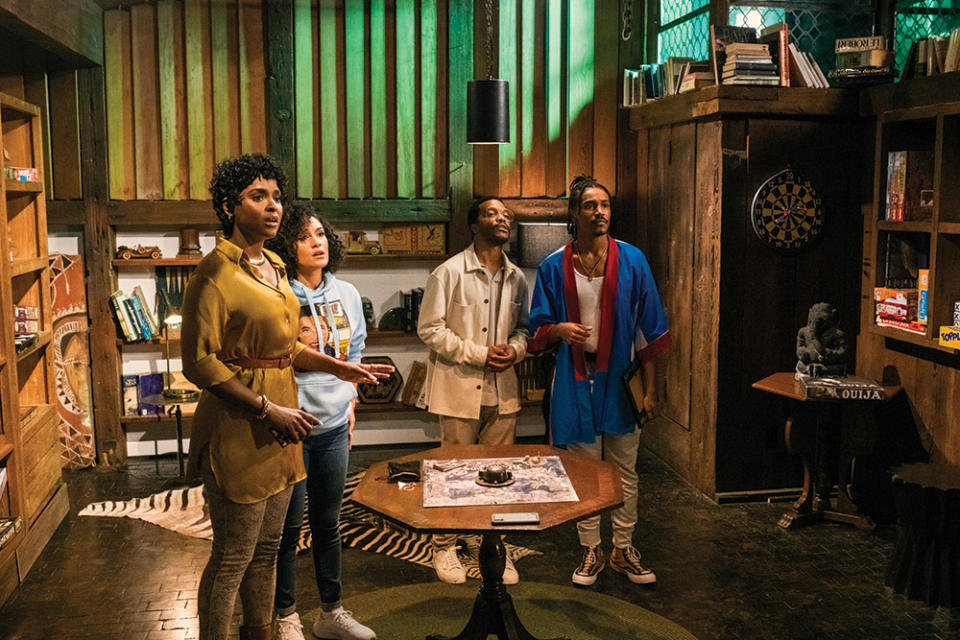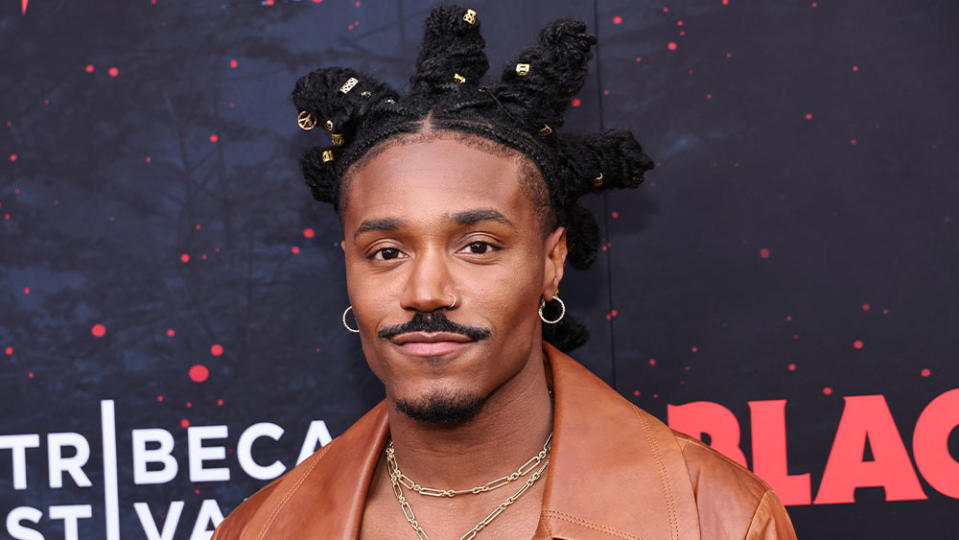‘The Blackening’ Star Dewayne Perkins on His Gay Horror Spoof Character and Mining His Coming-Out Story for Comedy

Unlike the character he wrote and plays in the horror spoof The Blackening, comedian Dewayne Perkins will not be staying at a cabin in the woods anytime soon. “I went camping once and it was one of those moments where I was like, ‘This is what this is? We’re really sleeping on the ground … outside?’ ” he says with a quizzical eyebrow during a video interview a few weeks before The Blackening opens in theaters June 16. “I never went back.”
However, as onscreen Dewayne (yes, he and his character share the same name, and they are both openly gay), he joins nine college besties at a cabin deep, deep in the woods over Juneteenth weekend. What was supposed to be a much-needed get-together among friends drinking highly sweetened drinks and indulging in trash-talking hijinks turns into them playing a bloody trivia game called The Blackening, which determines who’s Black enough and who isn’t. In The Fresh Prince of Bel-Air, how many seasons does dark-skinned Aunt Viv last before she’s replaced by light-skinned Aunt Viv? Everyone knows the first verse of the Black national anthem, “Lift Every Voice and Sing,” but do you know the lyrics to the second verse? Sing it, or else.
More from The Hollywood Reporter
'The Blackening' Review: Tim Story's Sharp and Witty Subversion of Horror Tropes
Transmasculine Actor Lío Mehiel Brings Vulnerability to the Post-Transition Experience in 'Mutt'
How Netflix's 'Spirit Rangers' Is Rewriting Animation's Native and Indigenous Representation
Perkins’ origin story began in Chicago, where he played high school football — as a way, he has said, to be with the cool kids — before becoming a part of the school’s improv team. But it was during his freshman year at DePaul University that he joined Second City and never looked back. He later became a member of another Chicago-based improv group, 3Peat, and wrote The Blackening as a sketch. The skit’s satirical brilliance of equating one’s level of Blackness with one’s worthiness to live or die caught the attention of Comedy Central Originals, who turned the sketch into a short five years ago. The Blackening went viral, launching Perkins as a bold new voice in comedy.

In between his improv group and stand-up, Perkins started writing for television series including The Break With Michelle Wolf, The Hip Hop Nutcracker and Brooklyn Nine-Nine. In 2021, he earned an Emmy nomination for outstanding writing for a variety series for his work on The Amber Ruffin Show and secured a recurring role on the Netflix series The Upshaws. Last year, The New York Times named him as one of the “queer young comics redefining American humor.”
For his stand-up routines, Perkins’ coming-out story has been golden. “I came out to my family that based on my upbringing and where I grew up, I thought, ‘They’re going to abandon me,'” he says, remembering the courage he gathered to tell his mother and four sisters. “I came out and they’re all like, ‘Yeah, girl, clearly, you are homosexual.'” With his father, the news hit a little different, but still, he says, “casual.” “Later, I brought my boyfriend to my nephew’s birthday party. And my father asked, ‘Who’s that guy?’ And I was like, ‘That’s my boyfriend.’ He said, ‘You’re gay?’ And I said, ‘Oh my God, I forgot to tell you.'”
Although his character Dewayne’s sexuality is not a central theme in The Blackening and only comes up as a half-baked excuse for him not to be killed in the game, Perkins very much wants audiences to not be indifferent to his queer identity but embrace it. “The care I would want is the acknowledgment of this part of me — acknowledge how that part affects the way that I live, the way that people perceive me, the way that I am received in the world. … This is the care that I want,” he says.
Perkins shares writing credit with Girls Trip scribe Tracy Oliver on The Blackening, thanks to support from other members of 3Peat, who pushed him forward when Oliver came calling. “When Tracy asked who wrote it and that we have to write a script, they were all like, ‘Dewayne, he should do it.’ They said, ‘This is his idea and we support it,'” he recalls.

“At that point, I had never written a movie, and I was pretty nervous. But Tracy was a very good mentor and really guided me through the process. I always felt supported. Tracy, Tim Story [the film’s director], the producers were always saying, ‘Don’t forget this is yours, this could not have happened without you,'” says Perkins, who’s collaborating with Story on developing the board game Clue into an animated series for Fox. “‘Never feel like you are not in a position to speak, always feel empowered.'”
Perkins spoke further with THR about the film and why its LGBTQ representation and answered a couple of lightning-round questions riffing off the theme of The Blackening:
Have you ever had your Black card revoked?
Yes. All the time. (Laughs.) A friend of mine just told me two days ago, “I never know what is going to come out of your mouth. You exist in this duality of: you might play Tupac or you might play the Cheetah Girls.” I felt pretty freed from defining what my Blackness was at a very young age, especially being queer. I feel empowered to present different versions of Blackness. Whenever someone says, “That’s not the Black thing to do.” I say, “But yet here I am doing it. It looks like you have to expand your thinking.”
Would you have gotten The Blackening‘s Friends question — about how many Black characters were on the show — right in real life?
I’ve seen a lot of Friends. My sister Brittany is obsessed with the show. I didn’t know until I got older about the perception of Friends and what some people thought about the show. I always felt that yeah, everybody is white and that’s the point of the show. … We’re watching white people in New York? I was like, “Let these white people be white.” So yes, I’d know all the answers. (Laughs.)
What significance does it hold for you that your character in The Blackening is a proud gay man?
To be perfectly honest, I only started writing because as a queer Black actor I was deeply unsatisfied with how few opportunities there were to actually play queer characters, and the parts that were coming my way were gravely underwritten, stereotypical, and always a tool to help further someone else’s narrative. We were never the lead. So having an opportunity to write and play a character who was not defined by their queerness but simply allowed to exist fully in all facets of himself was both cathartic and felt like a personal act of rebellion against the limited ways media often portray us. I hope Dewayne’s freedom and unapologetic way of living inspire other queer people to adopt a similar form of self-love. But I also hope it inspires Hollywood to continue to break away the boxes they’ve placed queer people into and understand that the gay best friend isn’t just a gay best friend, they can also be the hero. You just have to fucking let them!
A version of this story first appeared in the June 14 issue of The Hollywood Reporter magazine. Click here to subscribe.
Best of The Hollywood Reporter

 Yahoo News
Yahoo News 
